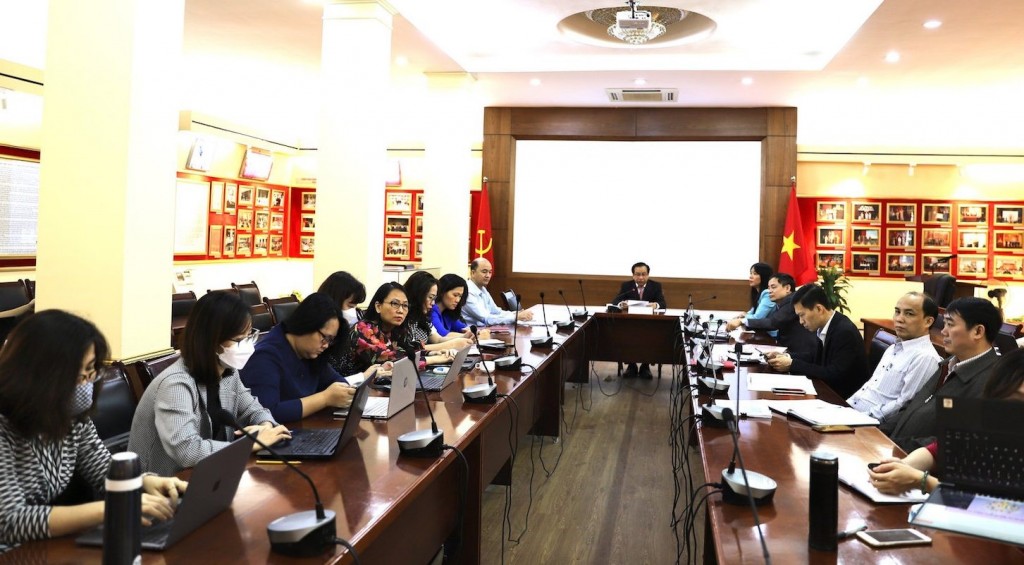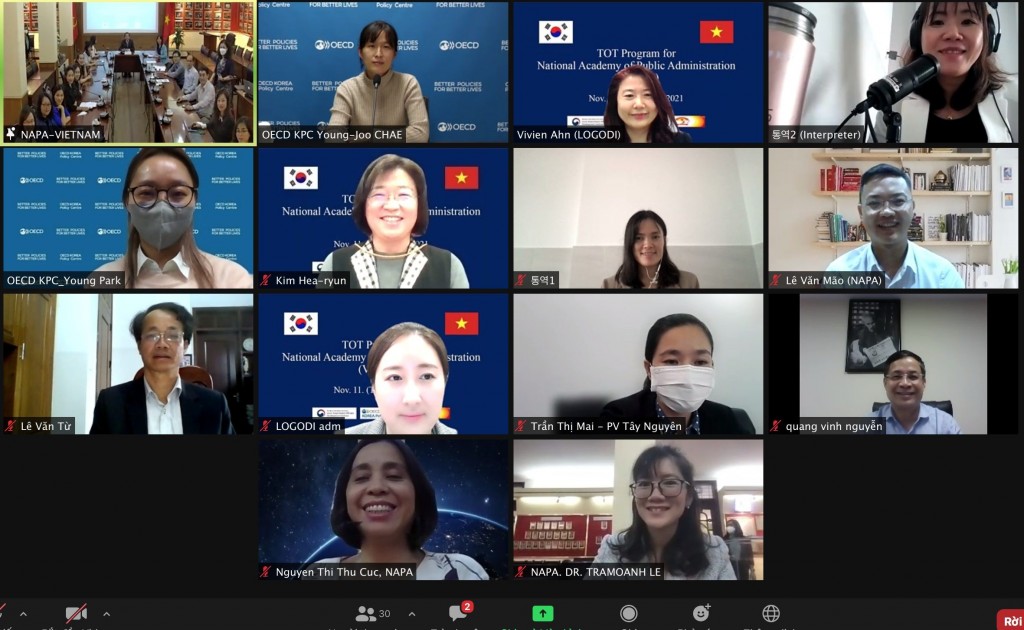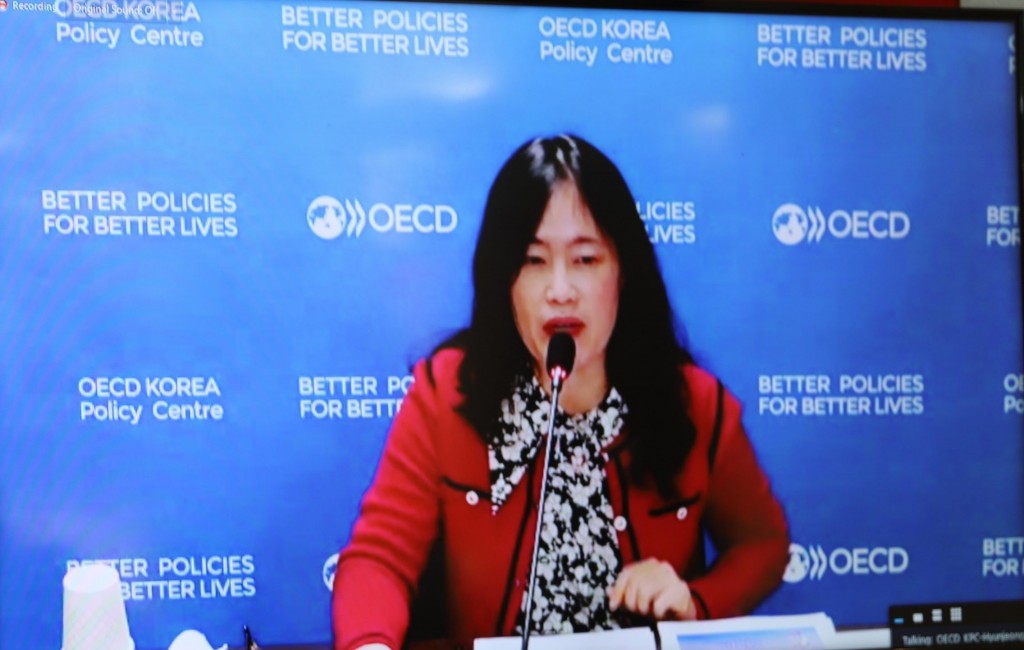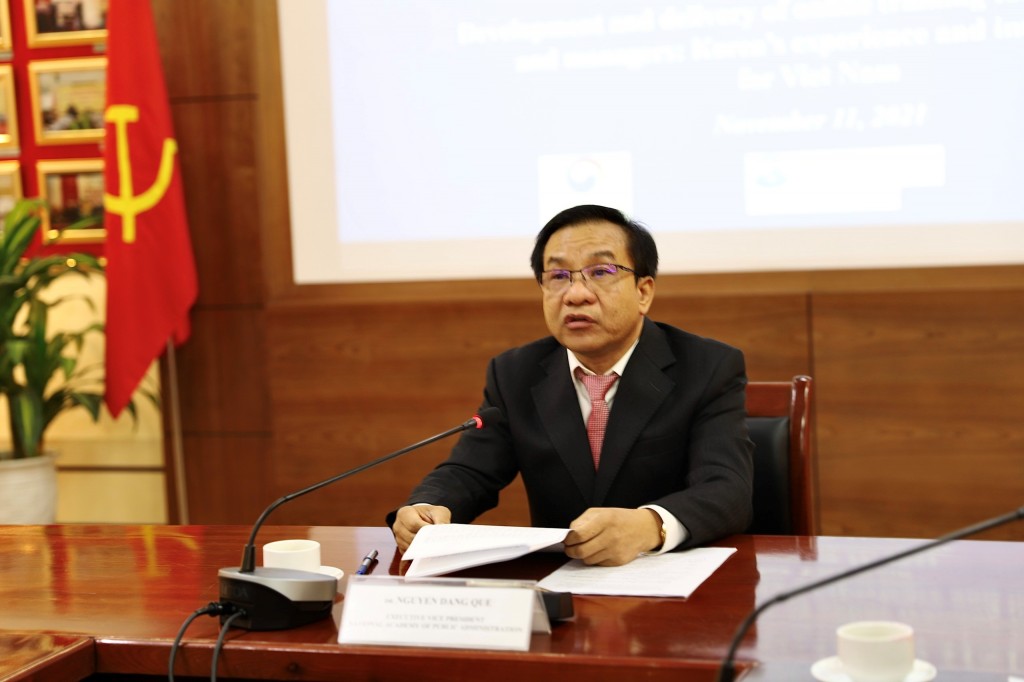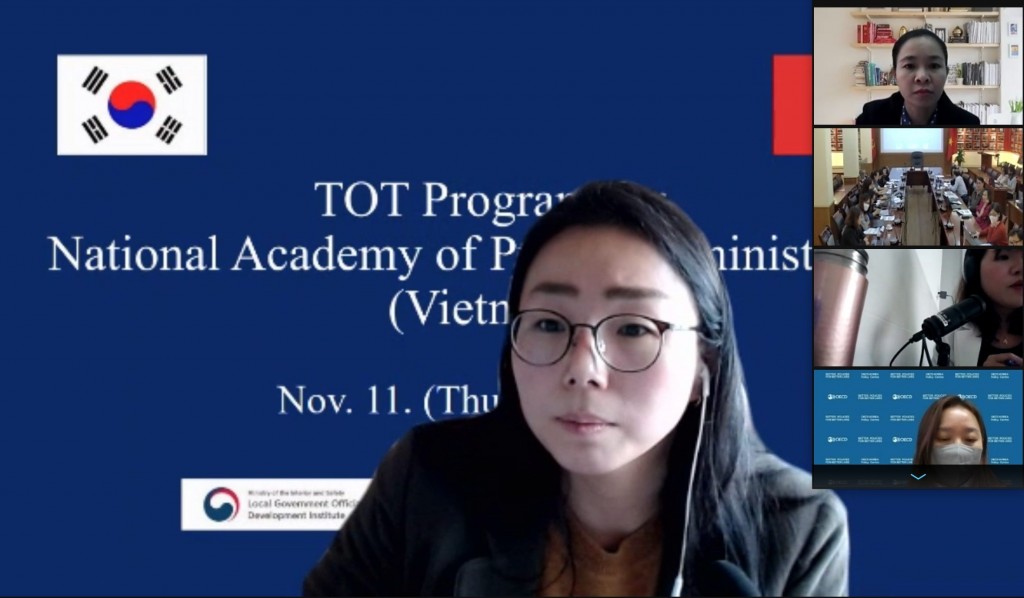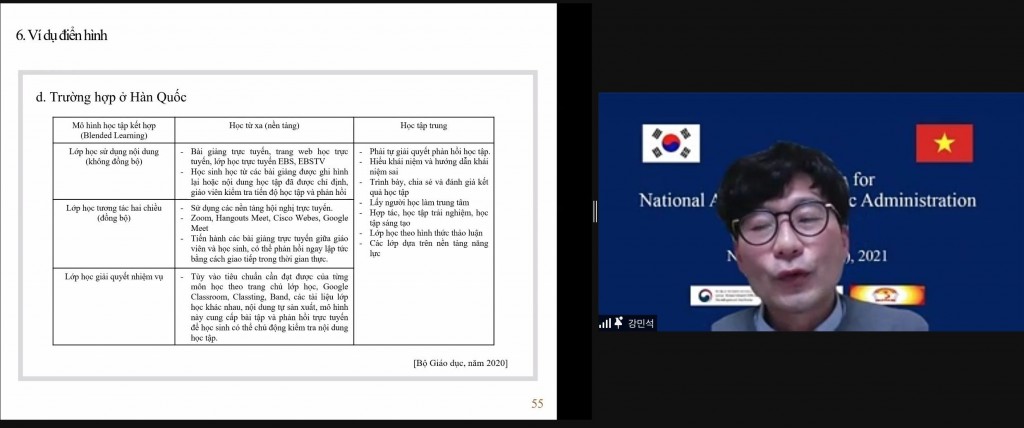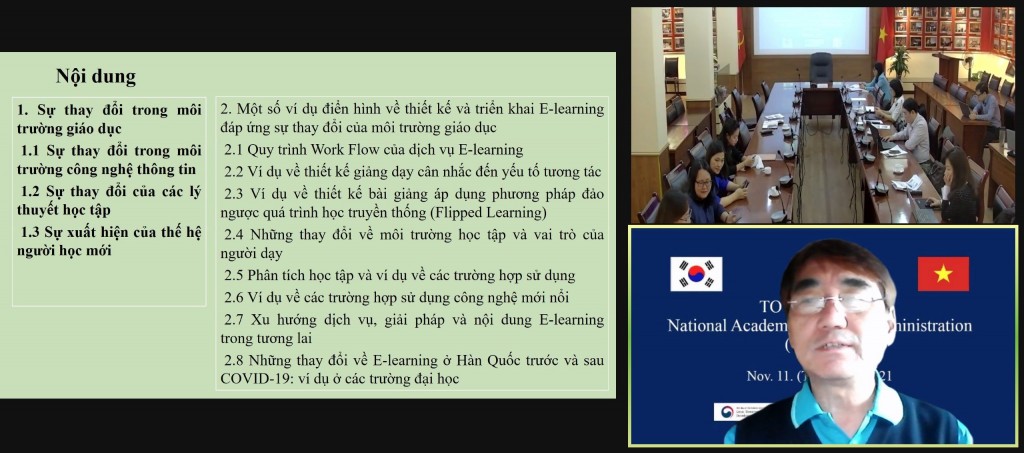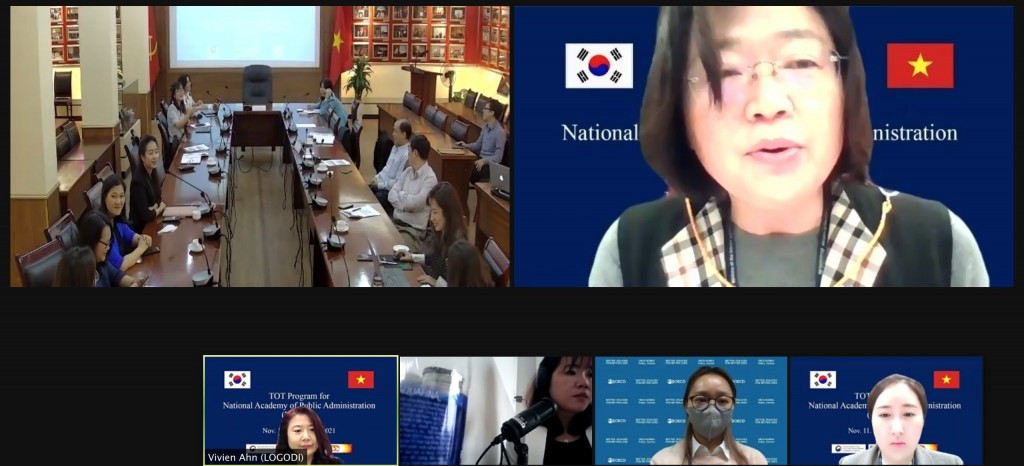On November 11, the National Academy of Public Administration in collaboration with the OECD Korea Policy Center (OECD KPC) and the Local Government Officials Development Institute (LOGODI), Korea organized a Training of Trainers (ToT) for NAPA officials and lecturers on building and implementing online training for public leaders and managers – Korean experience and implications for Vietnam.
Attending the opening ceremony of the ToT course, from the Korean side Ms. Hyeon Jung Lee, Director General, Public Governance Program, OECD Korea Policy Centre; Mr. Hong-Seog Noh, Director General, Planning Department, Local Government Officials Development Institute, Korea.
On the side of NAPA were Dr. Nguyen Dang Que, Executive NAPA Vice President; leaders and officials from Department of International Cooperation, Department of Organization and Personnel, and 30 learners who are NAPA lecturers and officials. ToT was conducted in the hybrid form with face-to-face participation in Ha Noi and virtual attendance in OECD KPC, LOGODI, Korean, and in NAPA Branches in Ho Chi Minh City, Central Highlands, and Hue City.
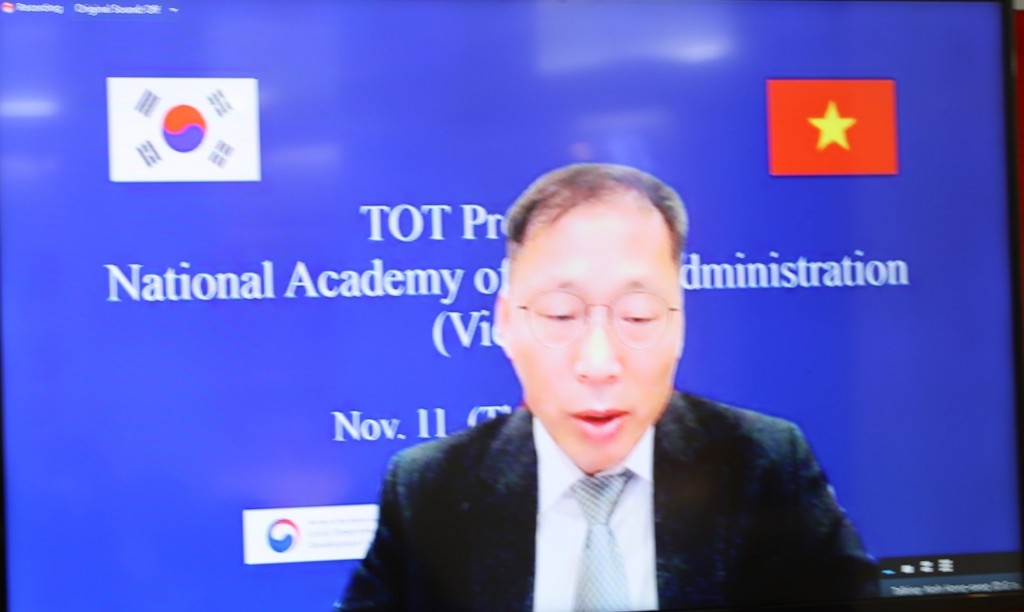
Mr. Hong-Seog Noh, Director General, Planning Department, Local Government Officials Development Institute, Korea.
Mr. Hong-Seog Noh, Director General, Planning Department, LOGODI stated, LOGODI started its cooperative relationship with Vietnamese partners in 2006 after its tailor-made training program for Vietnamese officials and civil servants in cooperation with UNDP. Up to present, it has trained about 280 Vietnamese central and local officials in collaboration with other international organization. In 2007, LOGODI and NAPA signed a Memorandum of Understanding on training for cadres and civil servants. Mr. Noh Hong Sick hopes that this opportunity will strengthen and further promote exchanges and cooperation between the two institutions.
On behalf of OECD Korea Policy Center, Ms. Hyeon Jung Lee, Director General, Public Governance Program welcome participants from LOGODI and NAPA as well as Dr. Lee Sun Hee, Dr. Kang Min Seok, and Dr. Han Tae-in as ToT lecturers. The ToT is the third event co-organized by OECD KPC and NAPA. She emphasized that ToT will provide an opportunity to discuss effective online training during the Covid-19 epidemic. She strongly believed that this ToT is useful for enhancing capacity of lecturers and development of NAPA’s online training for public leaders and managers.
Dr. Nguyen Dang Que – Executive Vice President of the National Academy of Public Administration, on behalf of NAPA’s leaders and staff, warmly welcomes international lecturers, experts, and 30 NAPA lecturers and officials participating in the online training course. “Developing and implementing online training for public leaders and managers – Korean experience and implications for Vietnam”. The ToT is conducted in the hybrid form with face-to-faced participation in Ha Noi and virtual attendance in Seoul and three NAPA Branches in Hue, Central Highlands, and Ho Chi Minh City. This is the third event held within the framework of the cooperation between the National Academy of Public Administration and the OECD Korea Policy Center.
Dr. Nguyen Dang Que emphasized the Covid-19 pandemic poses unprecedented challenges in all aspects of life, including education and training. In the context of the pandemic, training institutions must perform dual tasks of both actively preventing the epidemic, ensuring the safety and health of officials, lecturers and students, and at the same time renewing, adapting and constantly improving the quality of training. As soon as the outbreak began, NAPA actively transformed its training model from face-to-face to online and distance training on the electronic training platform called E-NAPA and use an electronic learning resources system. NAPA leaders and staff are deeply aware that online teaching and learning is not only an alternative solution for safety and epidemic prevention and control but also an inevitable development trend of education and training in Viet Nam in the 4.0 era, contributing to digital transformation and making NAPA an e-Academy. Online training allows to promote students’ ability for self-study.
NAPA Executive Vice President also believes that the leading Korean professors will bring a rich experience in both theory and practice for the ToT participants. He requested NAPA lecturers and officials participating in the ToT course to take advantage of this valuable opportunity and actively be involved in learning, discussion and exchange activities to best absorb knowledge and skills provided and shared by Korean experts to improve the quality of NAPA’s online training.
Prof. Ms. Lee Sun Hee, Cyber Hankuk University of Foreign Studies delivered a lecture with the topic: “Developing online training content”. She focused on five issues of online education, which are: (1) The change of times, educational theories, and educational environment; (2) Blended learning models and content design strategies; (3) Process and method of content development; (4) Performance evaluation and quality management; (5) Education develops through space.
Whether education is sustainable when face-to-face sessions move to online and webinars grow, which results in fatigue of online meetings. Therefore, we need to design and development sustainable education (in the post-Covid-19). She also mentioned the current shift of the educational environment from the classroom to everywhere, which results in an increase in online interaction, individual learning channels, virtual classrooms, and the rise of Zoom, WebEx, and so on.
She concluded that education changes according to the changes of the times. Accordingly, the teaching and learning model will be circular and flexible to adapt to the online learning model (with the emergence of Microlearning which divides the learning content into small units for faster absorption) and the use of online space as the main place of learning and research for the present and the future.
The lecture “The blended models of online and off-line learning” by Dr. Min Suk Kang, Kyung Hee Cyber University. He said that online education had also developed in parallel with offline education even before the Covid-19 pandemic. When the Covid-19 epidemic broke out, online education really became the mainstream method of education (contactless). However, it is advisable to balance both face-to-face and online education methods to increase learning effectiveness.
The reason to combine face-to-face and online training with the reason is that too much focus on online makes learners exhausted, the interaction between teachers and learners is reduced, and the correction and feedback of assignments is not adequate. Students are dissatisfied with internships and errors occur frequently when signing in online lessons. Therefore, blended learning is a better choice because it leverages the strengths of both offline and online training, giving learners more choices for their learning and working conditions.
Dr. Han Tae-In – Korea Open Online University presented a lecture with the topic: “Korean experience in online training”. The lecture focuses on the following contents: (1) Changes in the educational environment (including: changes in the information technology environment, changes in learning theories and the emergence of new generations of learners); (2) Designing and implementing E-learning to respond to the change of the educational environment (including: the process of E-learning activities; taking into account interaction in lesson design; application of reverse learning in lesson design; changes in the learning environment and roles of teachers; learning analytics and use of emerging technology; service, solution, and content of E-learning in the future; changes in E-learning in Korea before and after Covid-19 at universities).
After a day of seriously working, by the end of the afternoon of November 11, the training course had completed the planned contents. Speaking at the closing of the training course, Mrs. Hea-Ryun KIM, Director, International Training & Cooperation
Division, LOGODI, Ms. Young-Joo CHAE, Director, Public Governance Programme, OECD Korea Policy Centre were delighted that the training course was successful. Tot participants are expected to apply the knowledge learnt from the training course into NAPA’s online training and the practice of online training management.
Speaking in the concluding and closing remarks, Dr. Nguyen Dang Que expressed sincere thanks to OECD KPC, LOGODI and Korean experts for their time and dedication for the ToT course as well as the useful and practical knowledge shared with the training participants. He expected to extend NAPA’s cooperation with OECD KPC and LOGODI in the field of education and training.


